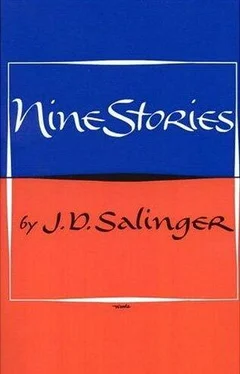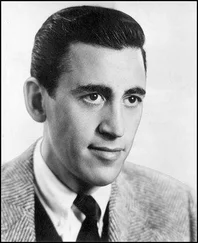Jerome Salinger - Nine Stories
Здесь есть возможность читать онлайн «Jerome Salinger - Nine Stories» весь текст электронной книги совершенно бесплатно (целиком полную версию без сокращений). В некоторых случаях можно слушать аудио, скачать через торрент в формате fb2 и присутствует краткое содержание. Год выпуска: 1953, Издательство: Little Brown, Жанр: Классическая проза, на английском языке. Описание произведения, (предисловие) а так же отзывы посетителей доступны на портале библиотеки ЛибКат.
- Название:Nine Stories
- Автор:
- Издательство:Little Brown
- Жанр:
- Год:1953
- ISBN:нет данных
- Рейтинг книги:4 / 5. Голосов: 2
-
Избранное:Добавить в избранное
- Отзывы:
-
Ваша оценка:
- 80
- 1
- 2
- 3
- 4
- 5
Nine Stories: краткое содержание, описание и аннотация
Предлагаем к чтению аннотацию, описание, краткое содержание или предисловие (зависит от того, что написал сам автор книги «Nine Stories»). Если вы не нашли необходимую информацию о книге — напишите в комментариях, мы постараемся отыскать её.
Nine Stories — читать онлайн бесплатно полную книгу (весь текст) целиком
Ниже представлен текст книги, разбитый по страницам. Система сохранения места последней прочитанной страницы, позволяет с удобством читать онлайн бесплатно книгу «Nine Stories», без необходимости каждый раз заново искать на чём Вы остановились. Поставьте закладку, и сможете в любой момент перейти на страницу, на которой закончили чтение.
Интервал:
Закладка:
When the Warriors were at bat, I went over to her bench and asked her if she felt like playing left field. She shook her head. I asked her if she had a cold. She shook her head again. I told her I didn’t have anybody in left field. I told her I had a guy playing center field and left field. There was no response at all to this information. I tossed my first-baseman’s mitt up in the air and tried to have it land on my head, but it fell in a mud puddle. I wiped it off on my trousers and asked Mary Hudson if she wanted to come up to my house for dinner sometime. I told her the Chief came up a lot. “Leave me alone,” she said. “Just please leave me alone.” I stared at her, then walked off in the direction of the Warriors’ bench, taking a tangerine out of my pocket and tossing it up in the air. About midway along the third-base foul line, I turned around and started to walk backwards, looking at Mary Hudson and holding on to my tangerine. I had no idea what was going on between the Chief and Mary Hudson (and still haven’t, in any but a fairly low, intuitive sense), but nonetheless, I couldn’t have been more certain that Mary Hudson had permanently dropped out of the Comanche lineup. It was the kind of whole certainty, however independent of the sum of its facts, that can make walking backwards more than normally hazardous, and I bumped smack into a baby carriage.
After another inning, the light got bad for fielding. The game was called, and we started picking up all the equipment. The last good look I had at Mary Hudson, she was over near third base crying. The Chief had hold of the sleeve of her beaver coat, but she got away from him. She ran off the field onto the cement path and kept running till I couldn’t see her any more.
The Chief didn’t go after her. He just stood watching her disappear. Then he turned around and walked down to home plate and picked up our two bats; we always left the bats for him to carry. I went over to him and asked if he and Mary Hudson had had a fight. He told me to tuck my shirt in.
Just as always, we Comanches ran the last few hundred feet to the place where the bus was parked, yelling, shoving, trying out strangleholds on each other, but all of us alive to the fact that it was again time for “The Laughing Man.” Racing across Fifth Avenue, somebody dropped his extra or discarded sweater, and I tripped over it and went sprawling. I finished the charge to the bus; but the best seats were taken by that time and I had to sit down in the middle of the bus. Annoyed at the arrangement, I gave the boy sitting on my right a poke in the ribs with my elbow, then faced around and watched the Chief cross over Fifth. It was not yet dark out, but a five-fifteen dimness had set in. The Chief crossed the street with his coat collar up, the bats under his left arm, and his concentration on the street. His black hair, which had been combed wet earlier in the day, was dry now and blowing. I remember wishing the Chief had gloves.
The bus, as usual, was quiet when he climbed in—as proportionately quiet, at any rate, as a theatre with dimming house lights. Conversations were finished in a hurried whisper or shut off completely. Nonetheless, the first thing the Chief said to us was “All right, let’s cut out the noise, or no story.” In an instant, an unconditional silence filled the bus, cutting off from the Chief any alternative but to take up his narrating position. When he had done so, he took out a handkerchief and methodically blew his nose, one nostril at a time. We watched him with patience and even a certain amount of spectator’s interest. When he had finished with his handkerchief, he folded it neatly in quarters and replaced it in his pocket. He then gave us the new installment of “The Laughing Man.” From start to finish, it lasted no longer than five minutes.
Four of Dufarge’s bullets struck the Laughing Man, two of them through the heart. When Dufarge, who was still shielding his eyes against the sight of the Laughing Man’s face, heard a queer exhalation of agony from the direction of the target, he was overjoyed. His black heart beating wildly, he rushed over to his unconscious daughter and brought her to. The pair of them, beside themselves with delight and coward’s courage, now dared to look up at the Laughing Man. His head was bowed as in death, his chin resting on his bloody chest. Slowly, greedily, father and daughter came forward to inspect their spoils. Quite a surprise was in store for them. The Laughing Man, far from dead, was busy contracting his stomach muscles in a secret manner. As the Dufarges came into range, he suddenly raised his face, gave a terrible laugh, and neatly, even fastidiously, regurgitated all four bullets. The impact of this feat on the Dufarges was so acute that their hearts literally burst, and they dropped dead at the Laughing Man’s feet. (If the installment was going to be a short one anyway, it could have ended there; the Comanches could have managed to rationalize the sudden death of the Dufarges. But it didn’t end there.) Day after day, the Laughing Man continued to stand lashed to the tree with barbed wire, the Dufarges decomposing at his feet. Bleeding profusely and cut off from his supply of eagles’ blood, he had never been closer to death. One day, however, in a hoarse but eloquent voice, he appealed for help to the animals of the forest. He summoned them to fetch Omba, the lovable dwarf. And they did. But it was a long trip back and forth across the Paris-Chinese border, and by the time Omba arrived on the scene with a medical kit and a fresh supply of eagles’ blood, the Laughing Man was in a coma. Omba’s very first act of mercy was to retrieve his master’s mask, which had blown up against Mlle. Dufarge’s vermin-infested torso. He placed it respectfully over the hideous features, then proceeded to dress the wounds.
When the Laughing Man’s small eyes finally opened, Omba eagerly raised the vial of eagles’ blood up to the mask. But the Laughing Man didn’t drink from it. Instead, he weakly pronounced his beloved Black Wing’s name. Omba bowed his own slightly distorted head and revealed to his master that the Dufarges had killed Black Wing. A peculiar and heart-rending gasp of final sorrow came from the Laughing Man. He reached out wanly for the vial of eagles’ blood and crushed it in his hand. What little blood he had left trickled thinly down his wrist. He ordered Omba to look away, and, sobbing, Omba obeyed him. The Laughing Man’s last act, before turning his face to the bloodstained ground, was to pull off his mask.
The story ended there, of course. (Never to be revived.) The Chief started up the bus. Across the aisle from me, Billy Walsh, who was the youngest of all the Comanches, burst into tears. None of us told him to shut up. As for me, I remember my knees were shaking.
A few minutes later, when I stepped out of the Chief’s bus, the first thing I chanced to see was a piece of red tissue paper flapping in the wind against the base of a lamppost. It looked like someone’s poppy-petal mask. I arrived home with my teeth chattering uncontrollably and was told to go right straight to bed.
Down at the Dinghy
IT was a little after four o’clock on an Indian Summer afternoon. Some fifteen or twenty times since noon, Sandra, the maid, had come away from the lake-front window in the kitchen with her mouth set tight. This time as she came away, she absently untied and re-tied her apron strings, taking up what little slack her enormous waistline allowed. Then she went back to the enamel table and lowered her freshly uniformed body into the seat opposite Mrs. Snell. Mrs. Snell having finished the cleaning and ironing was having her customary cup of tea before walking down the road to the bus stop. Mrs. Snell had her hat on. It was the same interesting, black felt headpiece she had worn, not just all summer, but for the past three summers—through record heat waves, through change of life, over scores of ironing boards, over the helms of dozens of vacuum cleaners. The Hattie Carnegie label was still inside it, faded but (it might be said) unbowed.
Читать дальшеИнтервал:
Закладка:
Похожие книги на «Nine Stories»
Представляем Вашему вниманию похожие книги на «Nine Stories» списком для выбора. Мы отобрали схожую по названию и смыслу литературу в надежде предоставить читателям больше вариантов отыскать новые, интересные, ещё непрочитанные произведения.
Обсуждение, отзывы о книге «Nine Stories» и просто собственные мнения читателей. Оставьте ваши комментарии, напишите, что Вы думаете о произведении, его смысле или главных героях. Укажите что конкретно понравилось, а что нет, и почему Вы так считаете.











